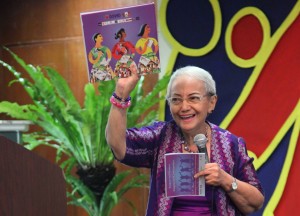
The coffee table book provides a snapshot of the gender mainstreaming gains of the KC-MCC project.
MANILA – Philippine Commission on Women (PCW) Chair Remedios Rikken praised the Kapit-Bisig Laban sa Kahirapan-Comprehensive and Integrated Delivery of Social Services (Kalahi-CIDSS) for empowering women and promoting gender equality in “Empowering Communities, Empowering Women” activity of the program, held in Makati last May 3.
As a community-driven development (CDD) program, Kalahi-CIDSS believes that every member in a village can play a valuable role in pushing for their community’s growth. As such, it uses affirmative action to improve women’s engagement in the program. Specifically, it promotes women’s engagement in community activities.
The high engagement of women in Kalahi-CIDSS through the program’s initiatives even led Chair person Rikken to propose the selection of GADtimpala Awards, conducted by the PCW to “recognize the outstanding achievement and performance of government agencies in upholding the rights of women and for effective implementation of gender-responsive programs.”
“I propose na ‘yung GADtimpala, hindi dapat by agency. Dapat by program! At sa tingin ko, ‘ di lang kayo bronze o silver. Dapat gold kayo (I propose that GADtimpala Awards will no longer be awarded by agency, but by program. I think that you don’t deserve just bronze or silver, but gold),” she exclaimed.
DSWD was previously awarded a GADtimpala Bronze Award in 2014.
Partnership
The event is part of the closing activities of KC-MCC, the project between Kalahi-CIDSS and the Millennium Challenge Corporation (MCC), an independent US aid agency.
The said activity recognized the various women leaders and volunteers who served through Kalahi-CIDSS, a program of the Department of Social Welfare and Development (DSWD). Select community volunteers, staff, and partners at the local government unit were also awarded as national Kalahi-CIDSS Gender and Development (GAD) following nominations from KC-MCC areas.
Part of the agreements between MCC and DSWD in the implementation of KC-MCC is the strengthening of the integration of GAD principles and practices in the program.
It also helps provide them with income-generating activities by way of short-term engagements as paid laborers during the construction of small-scale infrastructures through Kalahi-CIDSS, or livelihood trainings.
Gender incentive grant
MCC also provided a US$ 1 million complementary grant to the Kalahi-CIDSS for the Gender Incentive Grant (GIG), which further supported the GAD initiatives of the program and helped in the Kalahi-CIDSS’ thrust to make it a priority of communities and local governments.
A total of 2,966 women benefited from livelihood trainings provided through the GIG. Depending on the choices of communities, Kalahi-CIDSS can fund trainings for traditional livelihood, such as cooking and handicrafts, or non-traditional skills, such as plumbing, welding, and carpentry. A total of 1,375 women were trained in the latter, while 1,591 women and 645 men were trained in the former. Furthermore, 4,589 individuals were provided GAD trainings, and 17 women-friendly facilities were constructed through GIG.
A-team feat
For her part, DSWD Undersecretary for the Policy and Plans Group Florita Villar said, “If you want something done, you go not to the B or C team, but to the A team. Kalahi-CIDSS led the gender mainstreaming policy of the department. So for me, that is an A-team accomplishment”, referring to how Kalahi-CIDSS’ affirmative action on gender came first before the DSWD-wide policy.
Usec. Villar also emphasized that the women who served as paid laborers are paid the same wage as men.
“Today, we are claiming the results of all these endeavors”, she declared during her keynote speech.
Aside from gender mainstreaming, the partnership between Kalahi-CIDSS and MCC also led to the strengthening of the climate change adaptation and disaster risk reduction and management principles in the program implementation. ###


